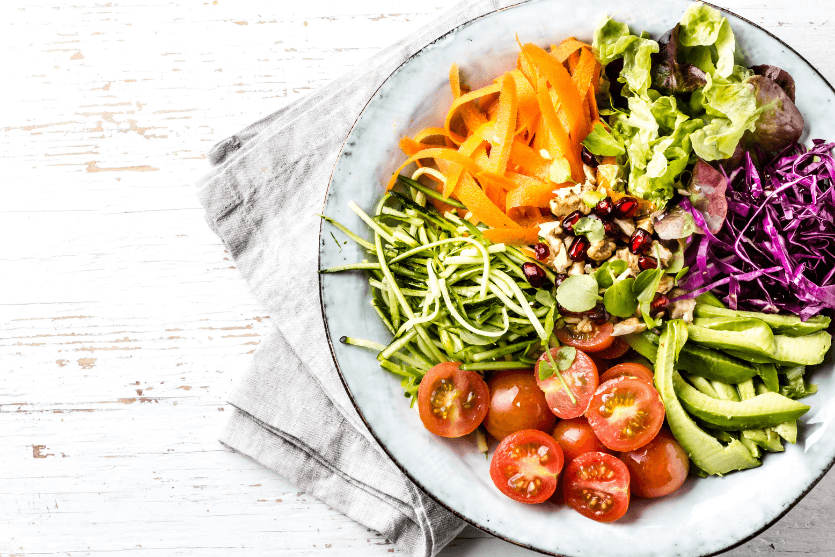Fruit for dessert, bread to accompany, meat with sauce… We eat certain foods in a way that is inertial. But, do we mix the products correctly? We compiled some simple guidelines to prevent bad digestive experiences.
There are essential foods for a healthy diet that we usually avoid because they can cause bloating, gas or heartburn. In fact, by combining food well we can prevent these discomforts.
And it is that it is to eat in a balanced way so important is the quality of the food we choose, as well as the quantity and its combination. A good synergy of proteins, carbohydrates, fats, and vegetables can contribute to a better state of health.
mix food
Poor digestion can cause the body to not assimilate nutrients well. According to nutritionist Carla Zaplana: “By combining food well, the digestive system requires less energy and the body can focus on other functions. This energy saving has an impact on our mood: we have more energy and vitality throughout the day”.
According to the Spanish Foundation of the Digestive System, an easy-to-digest food is one that does not require excessive action of the structures, glands, and secretions of the digestive system. That is, in a few steps it is divided into its nutrients, ready for absorption.
Thus, for example, foods with a high-fat content require a lot of effort to digest, relax the stomach muscles, make bowel movement difficult and make the pancreas work harder. This results in a feeling of bloating and slow digestion.
Healthy Meal Combo
The following ideas can help lighten and ease the digestion process:
- Acid fruits, kefir, and cinnamon. Acidic fruits such as citrus fruits (oranges, tangerines, lemons…), strawberries, kiwi or pineapple can increase stomach acidity and cause digestive discomfort. To counteract it, accompany them with kefir or yogurt.
In addition, you can sweeten the dessert with cinnamon, whose essential oils stimulate gastric juices and salivation, lightening digestion and preventing flatulence.
- Lettuce, carrot, and apple. Eating lettuce is very healthy, but there are people who do without salads because it causes gas.
You can combine lettuce with foods that help normalize the production of gastric juices, such as apples, carrots, or sprouts. Of course, add a light dressing.
- Meat, papaya, and strawberries. If after a meal that includes protein (meat, fish, tofu, legumes…) you eat pineapple or papaya, the enzymes they contain (bromelain and papain) will help you digest them and avoid digestive heaviness.
Strawberries are also very beneficial because their combination of vitamins, salicylic acid, and pectin stimulates gastric juices.
- Fatty foods and artichokes. Fatty meals usually result in heavy digestion. If you accompany them with artichokes, their cynarin content will help lighten them, since it stimulates the secretion of bile (responsible for digesting fats).
Other foods that have a similar effect are chicory, endive, escarole, radish, or aubergine.
- Legumes, yogurt, and cumin. The ideal dessert after a plate of vegetables is yogurt. Although chickpeas, lentils, and beans are very healthy, they can cause a lot of gas. But yogurt makes them more digestible.
To make them less flatulent you can add cumin to the cooking of the legumes or crush them once cooked. That is why hummus does not usually cause as much gas as a plate of chickpeas.
- Yogurt and fruits. The Quebec Cardiology Institute has found that the combination of both foods provides probiotics, prebiotics, high-quality protein, important fatty acids, and vitamins and minerals with potential health effects.
Yogurt is associated with reduced weight gain and a lower incidence of type 2 diabetes, while fruit has effects in reducing the risk of cardiovascular disease.
What foods should not be mixed
Fats and meat. Animal proteins are the most difficult group to digest. In addition, they usually contain fat per se. Do not mix them with fatty preparations. It is more convenient to combine meat with vegetables, lightly cooked foods, or grilled products.
Coffee and dessert. Caffeinated drinks (coffee, tea), carbonated drinks, or alcohol prevent the stomach muscles from relaxing. If you usually suffer from reflux problems, you should avoid them as much as possible. To finish the meals it is better to take digestive infusions, instead of coffee.
Legumes and fats. Although legumes are highly beneficial for health, they should not be mixed with fatty foods (meat, such as pork or lamb) or highly spicy dishes. This can increase gas production and make digestion heavier.
Alcohol and food. Avoid alcohol consumption while eating, as it slows down the muscles of the digestive tract. It produces delays in gastric emptying and leads to the appearance of a feeling of bloating.
Sauces and food. Sauces, dressings, or spices can cause bloating, flatulence, and various discomforts. It is best not to abuse them. Or use homemade and/or fruit-based alternatives that are healthier, lighter, and easier to digest.
As you can see, the way we mix food can help us improve digestion.
Remember that our intestines are considered “a second brain” and are linked to moods. If you learn to control stress, you can also avoid many gastrointestinal problems.

